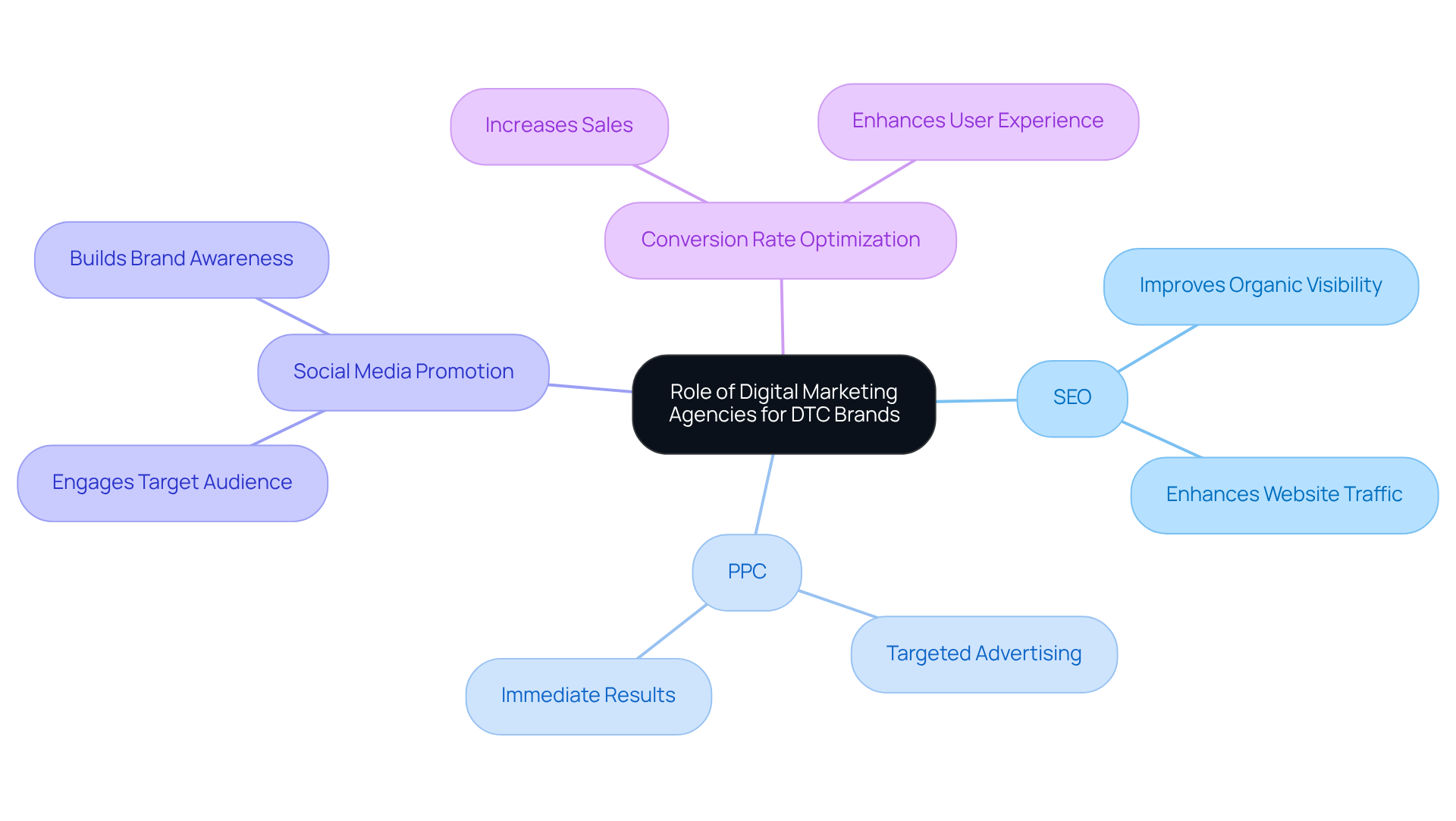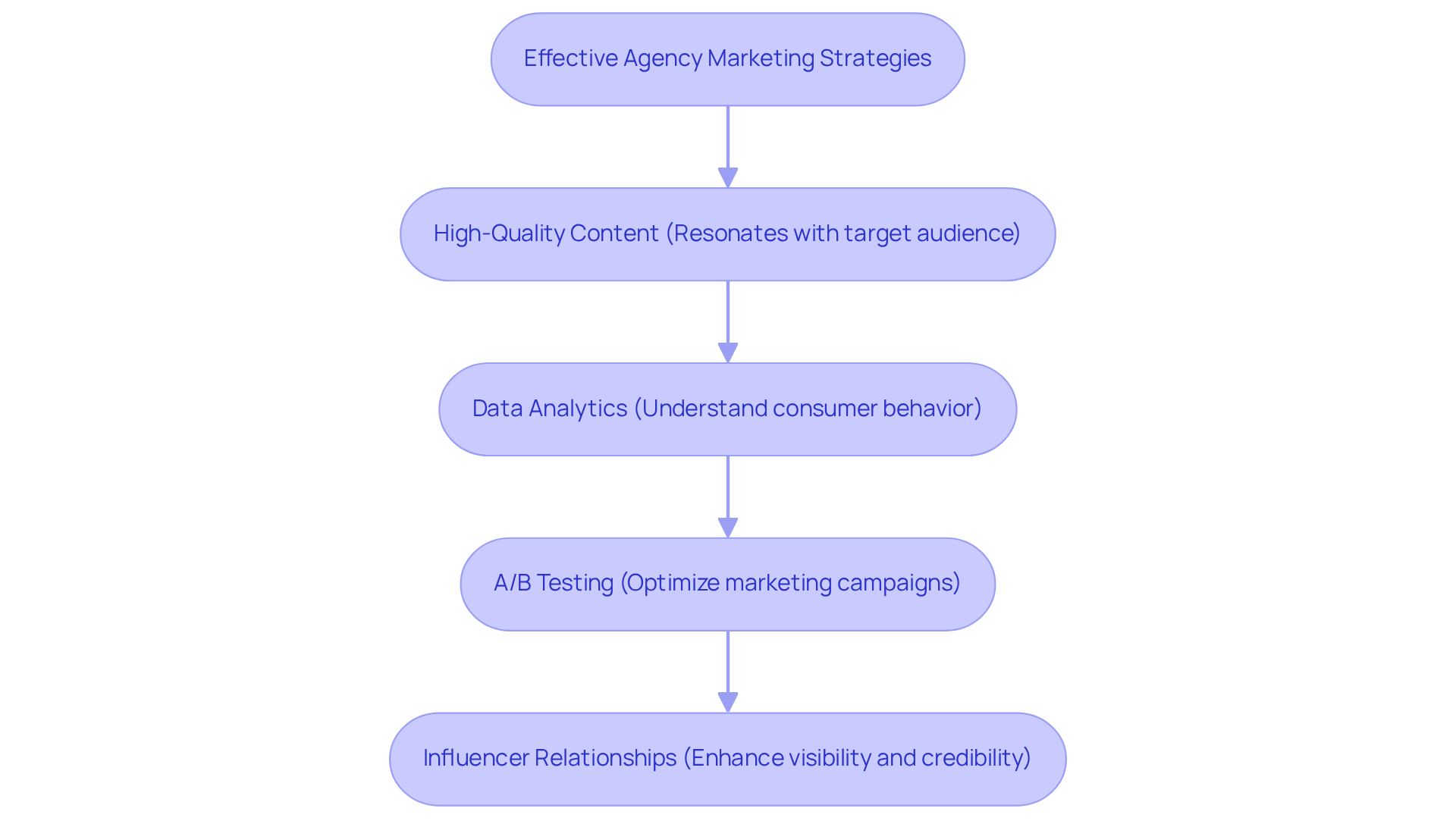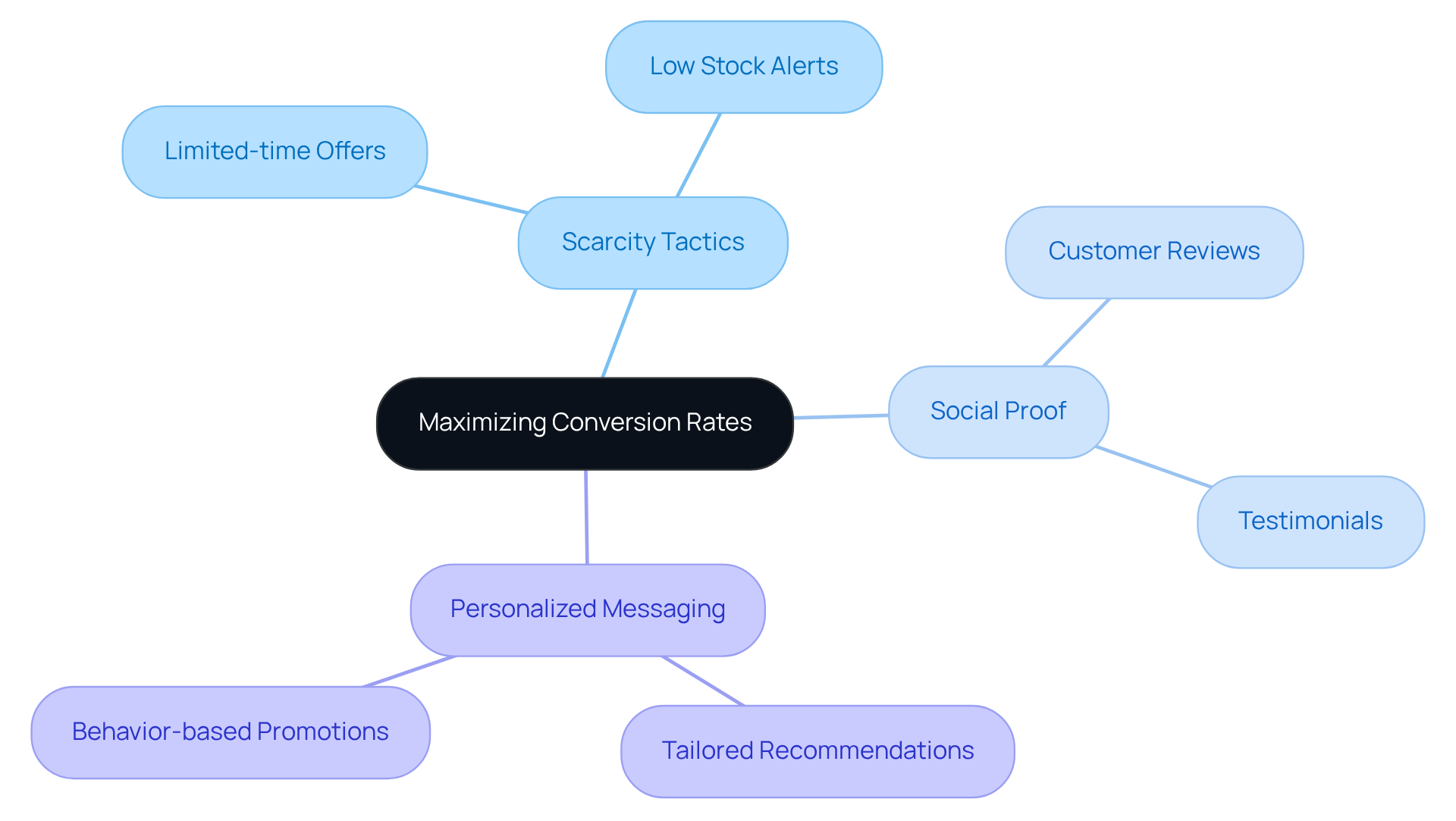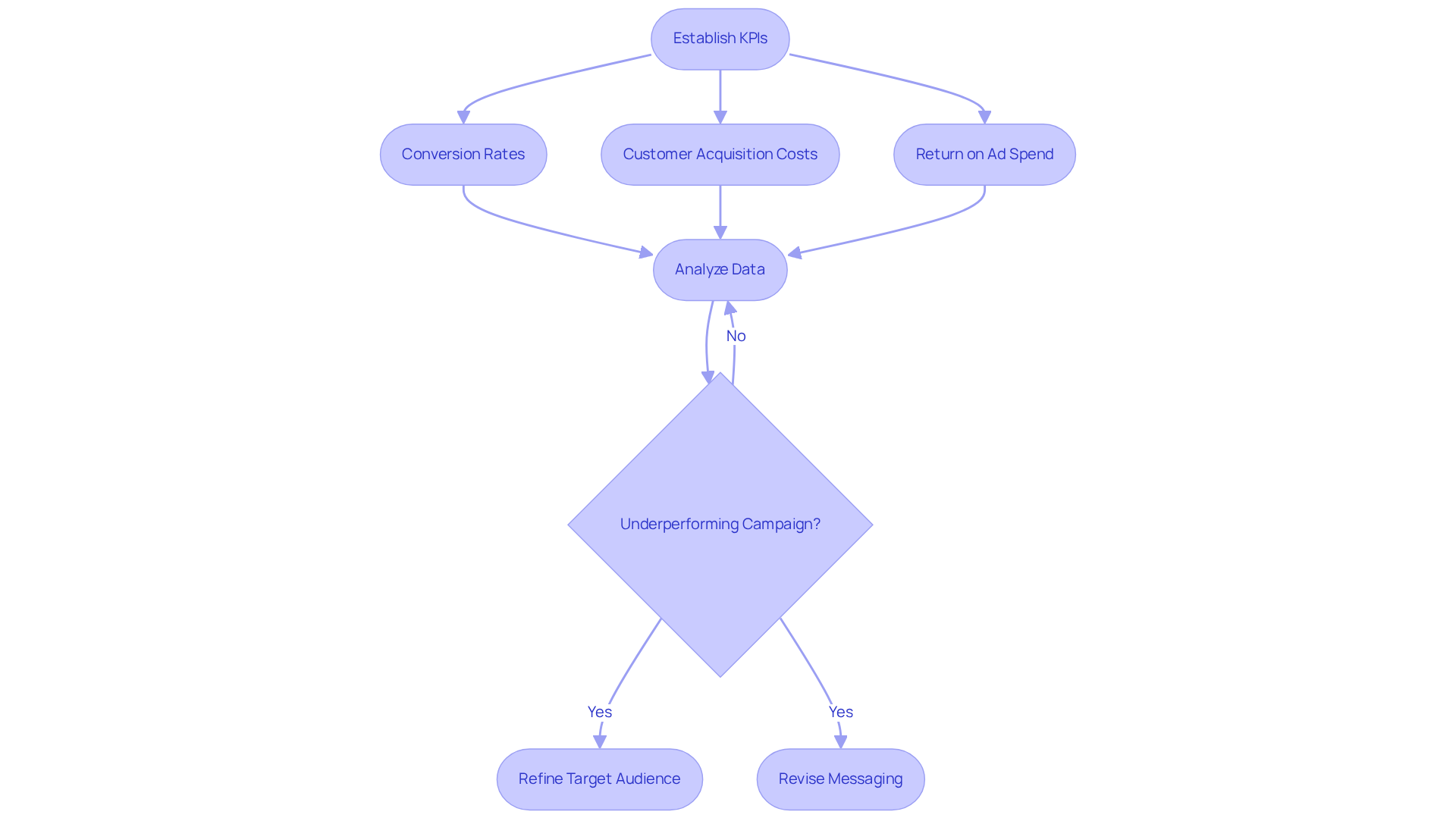
Overview
This article presents four proven digital marketing strategies that direct-to-consumer (DTC) brands can implement to significantly enhance their marketing effectiveness and drive sales.
- Creating high-quality content is essential; it not only attracts consumers but also establishes brand authority.
- Leveraging data analytics for consumer behavior insights allows brands to tailor their strategies effectively, ensuring they meet the specific needs of their audience.
- Employing A/B testing for optimization enables brands to refine their approaches based on real-time feedback, maximizing their impact.
- Utilizing principles of consumer psychology can significantly boost conversion rates by aligning marketing efforts with the innate motivations of consumers.
Each of these strategies is supported by compelling examples that illustrate their successful application within the industry, providing actionable insights for brands looking to elevate their marketing efforts.
Introduction
Navigating the competitive landscape of direct-to-consumer (DTC) brands demands not only innovative products but also astute marketing strategies that resonate deeply with consumers. Digital marketing agencies are integral to this ecosystem, providing specialized knowledge and tools that empower DTC companies to elevate their online presence and boost sales. As brands contend with soaring customer acquisition costs and the pressing need for effective conversion tactics, a pivotal question emerges: which proven strategies can genuinely enhance their marketing efforts and cultivate sustainable growth in an ever-evolving digital marketplace?
Understand the Role of Digital Marketing Agencies for DTC Brands
Agency marketing digital firms are essential to the success of direct-to-consumer (DTC) companies, offering specialized expertise and resources that may not be readily available internally. These agencies understand the unique challenges faced by DTC companies, including high customer acquisition costs and the necessity for effective conversion strategies.
By leveraging their proficiency in areas such as:
- SEO
- PPC
- Social media promotion
- Conversion rate optimization
agency marketing digital empowers DTC companies to enhance their online visibility and drive sales. Furthermore, these agencies often possess advanced tools and analytics that yield valuable insights into consumer behavior, enabling companies to make that lead to improved performance and profitability.
For instance, a DTC company collaborating with an agency marketing digital can benefit from tailored marketing strategies that align with their specific objectives, ultimately resulting in increased revenue and enhanced customer loyalty.

Implement Proven Strategies for Effective Agency Marketing
To effectively promote their products, DTC companies must leverage several proven strategies that have consistently demonstrated success in the industry. First and foremost, these companies should prioritize the creation of high-quality content that resonates with their target audience. This encompasses blog posts, videos, and social media content that not only showcase products but also deliver genuine value to consumers. For instance, SEOULBOX achieved an impressive 287% increase in email revenue by implementing strategic content strategies, which included targeted email campaigns informed by user behavior analytics. This remarkable success was propelled by Underground Ecom's commitment to .
Secondly, harnessing data analytics to understand consumer behavior can empower brands to tailor their promotional initiatives effectively. By examining buyer purchase patterns, companies can craft targeted email campaigns that encourage repeat purchases and elevate overall engagement. Brands that adeptly leverage customer behavior analytics can significantly boost their return on investment, as evidenced by Parah Group's achievement of a 36% increase in ROI on advertisements for their clients.
Thirdly, employing A/B testing for promotional campaigns allows companies to identify which messages and visuals yield the best performance, thereby optimizing their marketing expenditures. This iterative approach ensures that marketing strategies are continuously refined based on real-time performance data.
Finally, cultivating robust relationships with influencers can significantly enhance visibility and credibility. Influencers possess the ability to authentically endorse products to their followers, fostering a trusted connection that drives conversions. Notably, companies that have successfully collaborated with influencers have witnessed substantial increases in both engagement and sales. By implementing these strategies, DTC companies can elevate their marketing effectiveness and achieve higher conversion rates, ultimately paving the way for sustainable growth.

Leverage Consumer Psychology to Maximize Conversion Rates
Leveraging consumer psychology stands as a powerful strategy for DTC brands aiming to maximize conversion rates. Understanding the that influence purchasing decisions is paramount. For instance, implementing scarcity tactics, such as limited-time offers or low stock alerts, can instill a sense of urgency that compels consumers to act swiftly.
Furthermore, incorporating social proof—such as customer reviews and testimonials—builds trust and credibility, significantly increasing the likelihood of conversion. Another effective method involves customizing promotional messages based on consumer behavior and preferences, which can markedly enhance engagement and conversion rates.
For example, sending personalized product recommendations tailored to past purchases often leads to higher average order values. By applying these psychological principles, DTC companies can craft more engaging promotional strategies that resonate with their audience and drive conversions.

Measure and Analyze Marketing Performance for Continuous Improvement
To ensure continuous improvement in promotional efforts, DTC companies must prioritize the of their performance. This necessitates the establishment of clear KPIs (Key Performance Indicators) that align with business objectives, including:
- Conversion rates
- Customer acquisition costs
- Return on ad spend
By employing analytics tools, companies gain valuable insights into the efficacy of their promotional campaigns, enabling them to identify effective strategies and those requiring modification. Regular evaluation of these metrics empowers companies to make informed decisions regarding resource allocation and the enhancement of their promotional strategies.
For example, if a particular ad campaign is underperforming, companies can analyze the data to understand the underlying reasons and implement necessary adjustments, such as:
- Refining the target audience
- Revising the messaging
By cultivating a culture of data-driven decision-making, DTC brands can consistently optimize their marketing strategies to achieve superior results.

Conclusion
Digital marketing agencies are indispensable to the success of direct-to-consumer (DTC) brands, offering specialized expertise and resources that address their unique challenges. By leveraging advanced strategies in SEO, PPC, social media, and conversion optimization, these agencies empower DTC companies to enhance their online presence, drive sales, and make informed, data-driven decisions that ultimately lead to improved profitability and customer loyalty.
The article underscores several proven strategies for effective agency marketing, including:
- The creation of high-quality content
- Harnessing data analytics for consumer insights
- Employing A/B testing
- Building relationships with influencers
These approaches have consistently demonstrated their effectiveness in increasing engagement and conversion rates, as evidenced by success stories from various DTC brands. Furthermore, an understanding of consumer psychology—such as employing scarcity tactics and social proof—maximizes conversion potential.
In today's rapidly evolving digital landscape, it is imperative for DTC brands to embrace these strategies and continuously measure their marketing performance to foster growth. By establishing clear KPIs and cultivating a culture of data-driven decision-making, brands can refine their promotional efforts and adapt to changing consumer behaviors. The significance of implementing these best practices cannot be overstated; they pave the way for sustainable success and long-term brand loyalty in the competitive DTC market.
Frequently Asked Questions
What is the role of digital marketing agencies for DTC brands?
Digital marketing agencies are crucial for the success of direct-to-consumer (DTC) companies by providing specialized expertise and resources that may not be available internally.
What challenges do DTC companies face that digital marketing agencies can help with?
DTC companies often face high customer acquisition costs and the need for effective conversion strategies, which digital marketing agencies can address.
Which areas of expertise do digital marketing agencies leverage for DTC brands?
Digital marketing agencies leverage expertise in SEO, PPC, social media promotion, and conversion rate optimization to enhance the online visibility and sales of DTC companies.
How do digital marketing agencies assist DTC companies in making data-driven decisions?
These agencies possess advanced tools and analytics that provide valuable insights into consumer behavior, enabling DTC companies to make informed decisions that improve performance and profitability.
What are the benefits of collaborating with a digital marketing agency for a DTC company?
By collaborating with a digital marketing agency, a DTC company can benefit from tailored marketing strategies that align with their specific objectives, leading to increased revenue and enhanced customer loyalty.
FAQs











